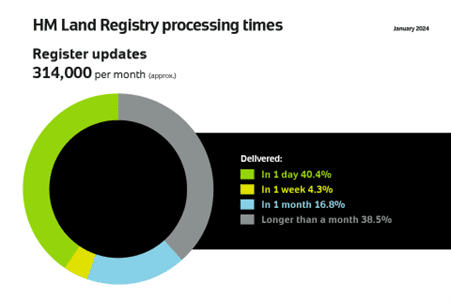Title deeds are an essential document when buying and selling property and land. But what are title deeds? What are they used for? And why are they so important?
In this article, you’ll discover everything you need to know about house deeds.
Key Takeaways
- Title deeds are important documents that prove past and current ownership over property and land.
- They’re used by solicitors and conveyancers to prove the seller owns the property and has the right to sell it.
- They’re also often used in property disputes and in divorce proceedings.
- You are unlikely to have a paper copy of your title deeds as they’re stored digitally at HM Land Registry.
- Title deeds show both covenants and easements.
- You can request a copy and make changes to your title deeds.
- The land registry receive 314,000 register updates every month and aim to process them as soon as possible.
- You can sell a property without title deeds, but it can be a complicated process. It can also negatively affect the value of the property.
- You can also buy a property without title deeds, but it can be expensive and risky. Your lender will also require you to take out Possessory Title Indemnity Insurance.
What Are Title Deeds?
Title deeds are a record of ownership for land and property. They don’t only prove who owns a property and land, but they also show the history of its ownership.
Besides showing a property’s history of ownership, title deeds;
- Show the approximate boundaries, and
- State if any rights or access considerations apply
A set of title deeds can include a range of different types of documents. Some of which often surprise people. Documents include;
- Mortgages
- Leases
- Conveyances
- Contracts of sale
- Wills
What Are Title Deeds Used For?
As already mentioned, title deeds prove the ownership of property and land.
This is most often needed during the sale process. When selling a property, your solicitor will request copies and provide them to the buyers conveyancers. They will review them to make sure you are the legal owner of the property as you say you are.
However, they’re often needed to help resolve legal issues like boundary disputes and right of way.
Title deeds are sometimes needed in divorce proceedings. They establish how a shared property is owned.
What Do Title Deeds Look Like?
In the past, a set of title deeds were collections of hand-written legal documents. However, this is no longer the case.
Since the introduction of the Law of Property Act 1925, title deeds have been typed.
You are unlikely to see a physical paper of copy of your title deeds. You no longer need to have them yourself when you buy a house or sell a property to someone else.
That said, if you have paper copies of title deeds, it might be worth keeping them. They might contain information about a property that is otherwise hard to find.
Who Holds the Title Deeds?
Today, the HM Land Registry stores them digitally as scanned documents. So that’s the first place to look.
The registration of residential property became mandatory in 1990. So if the property has been sold since then, the Land Registry will have digital copies.
However, if a property has remained in the same hands since 1990, then chances are, the original paper copies haven’t been scanned and stored.
Can I Get a Copy of My Title Deeds?
Yes. You can request a copy of your title deeds from the HM Land Registry.
The Law of Property Act 1988 allowed the public to access copies of a property’s title register without the knowledge or consent of its owners. The title register is a summary of the title deed.
If you need a specific document, you will need to fill in a Deeds Request Form. To do this you need to support your application with documents that prove your history with the property.
However, if you’re buying or selling a property or land, your solicitor will handle this for you.
Do Title Deeds Show Covenants?
Covenants are normally recorded in the title register. Supporting documents make up part of the title deed itself.
There are two types of covenants;
- Restrictive covenants: Stay with the land and continue to apply to a property, regardless of how many times it is bought and sold.
- Personal covenants: Apply only to the person who buys the land. If they then sell it, the covenant won’t apply to the new owner.
Do Deeds Show Easements?
Like covenants, easements are usually recorded in the title register with supporting documents making up part of the title deed.
There are four main types of easements:
- Rights of way
- Rights of light
- Rights of support
- Rights relating to artificial waterways
Can I Make Changes to My Title Deeds?
It is sometimes necessary to make changes to a set of title deeds. This could be after getting married or divorced for example.
You can make changes by completing an AP1 form on the GOV.uk website. There is a small fee, and you’ll need to provide proof of ID and have the application signed by a solicitor. Or you could hire a solicitor to complete the process for you. Especially if you need to make complicated changes.
How Long Does it Take the Land Registry to Change Title Deeds?

They aim to process applications as quickly as possible.
According to the HM Land Registry, they receive 314,000 register updates every month. These include;
- Registering property transfers
- Updating mortgages against a property, and
- Changes names on a property
On average, they complete;
- 40.4% in 1 day
- 4.3% in 1 week
- 16.8% in1 month
- 38.5% take longer than a month
Can You Sell a Property Without Title Deeds?
You can sell a property without title deeds, but it isn’t a straightforward process.
Often the best way to move forward is to get a Possessory Title Deed, also known as a Qualified Title.
Another way to proceed is to provide the buyer and their lender with a statutory declaration. This is a sworn statement that explains the loss of the deeds before the buyers lender will lend.
Trying to sell a property without the original title deeds, or ‘Absolute Title’ can turn out to be a long, drawn-out process. It can also affect the value of the property.
Should I Buy a Property Without Title Deeds?
You can buy a property without title deeds. However, it can be risky.
First, you need to be sure that your solicitor has the knowledge to take on such a purchase. You also need to be prepared to cover the cost of the extra work they will encounter making sure everything is right and proper before you exchange contracts.
Your lender will also expect you to take out Possessory Title Indemnity Insurance to protect against other parties claiming ownership over your land.
The term ‘buyer beware’ applies to all property transactions. However, ‘Caveat Emperor’ is crucial when buying a property without title deeds.
Can I Replace Lost Deeds?
Paper copies of title deeds are easy to lose. Especially through inheritance or in disasters like house fires and floods.
If the Land Registry doesn’t have digital copies, replacing paper deeds is often complicated.
In a situation like this, you could;
- Check with the solicitor you instructed when buying the property: they might still have records stored away.
- Check with your mortgage lender: it used to be common practice for mortgage lenders to held onto title deeds if they needed to repossess a property.
If you still can’t find your deeds you’ll need to apply for a First Registration based on a Statement of Truth. This is a complicated process the involves providing HM Land Registry with a full, factual account of the circumstances that lead to the loss of your deeds.

